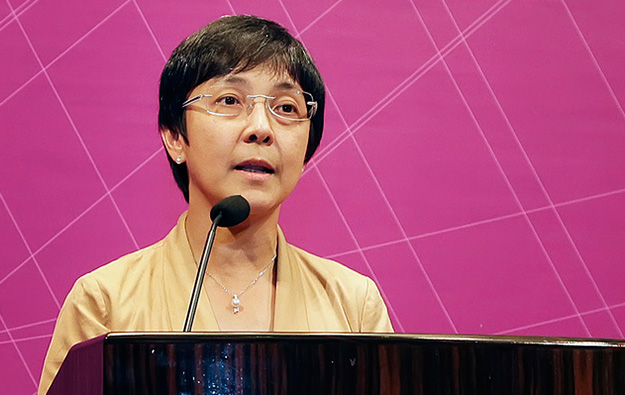Non-gaming revenue at 40pct good target: MGTO head
May 17, 2018 Newsdesk G2E Asia 2018, Latest News, Macau

Maria Helena de Senna Fernandes, director of the Macao Government Tourism Office (MGTO), said she would be pleased if the city’s casino industry could achieve 40 percent non-gaming revenue as a percentage of sector-wide revenue.
“I wouldn’t be so ambitious as to say 60 percent non-gaming and 40 percent gaming. Probably I would be a little bit more conservative, going for a 40-60 split in terms of 40 percent for non-gaming and 60 percent gaming in the medium term,” said Ms Senna Fernandes (pictured in a file photo).
She was speaking during a conference session at the Global Gaming Expo (G2E) Asia 2018, a three-day trade exhibition and conference taking place in Macau until Thursday.
“Gaming will continue to play a very important role in Macau, but at the same time – in terms of the government – we are not looking only at gaming … but also to develop non-gaming elements,” added the MGTO director.
Allan Zeman, non-executive chairman of casino operator Wynn Macau Ltd, said during the same panel that non-gaming “is a big part of the future” of Macau. Mr Zeman said that in the case of casino resorts in Las Vegas, in the United States, about 60 percent of revenue is generated from non-gambling activities, adding that Macau could take that as a reference.
The businessman said additionally that Macau needs to step up its non-gaming offering.
“We can see a change right now in Macau with all the shopping malls, the Michelin-starred restaurants,” said Mr Zeman. “It will just continue because the [casino] operators have the money to invest in creating these experiences,” he added.
Tackling obstacles
In Macau’s Five-Year Development Plan – a package of policies and initiatives covering the period 2016 to 2020 published in 2016 – the city’s government stated that non-gaming revenue within Macau’s casino sector should account on average for at least 9 percent of all revenue generated by Macau operators by 2020.
Macau’s Secretary for Economy and Finance, Lionel Leong Vai Tac, said in November last year that direct non-gaming revenue generated in 2016 by the city’s gaming operators had represented approximately 10.7 percent of the casino sector’s overall revenue that year.
A February report from the Morgan Stanley banking group however suggested that Macau casino operator non-gaming revenue “may never reach” the heights of the Las Vegas market.
Also speaking on Wednesday’s panel, Wilfred Wong Ying Wai, president and executive director of Sands China Ltd, said Macau “should not be shy about the gaming sector”.
“We are the only city in China where gaming is allowed. This is our unique advantage and we should take full advantage of it,” said the executive.
Mr Wong stated that the integrated resort concept “doesn’t mean gaming only”, because the emphasis is “much more” on other components. But the executive warned that a couple of obstacles would need to be tackled in order to promote further the development of Macau’s casino sector, including the industry’s non-gaming offerings.
He said: “The thing to do now is that we need to solve a couple of issues: first where do the people in the service industry come from, because Macau has a very small population and there’s a limited pool of talent; secondly, how to promote Macau to the world, when in people’s minds Macau is still a gaming centre.”
Mr Wong nonetheless said that Macau was on the right path, as the market continues to expand its offerings to cater to different tourist segments. “I feel that Macau eventually is going to be a tourist destination for all ages,” he added.
Related articles
-
 Macau 3Q GDP up 5pct driven by...
Macau 3Q GDP up 5pct driven by...Nov 18, 2024
-
 SJM posts profit of US$13mln in 3Q,...
SJM posts profit of US$13mln in 3Q,...Nov 12, 2024
More news
-
 Primorye casinos draw 365k visitors in...
Primorye casinos draw 365k visitors in...Nov 25, 2024
-
 Gaming taxes 82pct of Macau govt rev in...
Gaming taxes 82pct of Macau govt rev in...Nov 25, 2024
Latest News
Nov 25, 2024
The Primorye gambling zone, in the Russian Far East, welcomed close to 365,500 visitors in the first six months of 2024, according to local authorities. The figure was up by around 50,000 people...Sign up to our FREE Newsletter
 (Click here for more)
(Click here for more)
Pick of the Day
US$829.3 million
Fiscal revenue from taxes on gaming collected in October by the Macau government
Most Popular
 Wynn Al Marjan building structure 55pct complete: promoter November 22, 2024
Wynn Al Marjan building structure 55pct complete: promoter November 22, 2024  David Chow steps in for mother as Macau Legend director December 10, 2018
David Chow steps in for mother as Macau Legend director December 10, 2018  GKL provides its new table game ‘BROG’ to Landing Casino November 22, 2024
GKL provides its new table game ‘BROG’ to Landing Casino November 22, 2024  Star Entertainment clinches US$130mln loan facility November 21, 2024
Star Entertainment clinches US$130mln loan facility November 21, 2024









